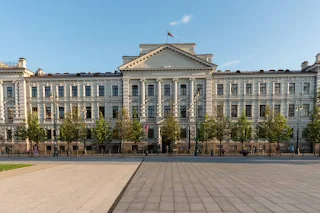The world is witnessing a significant shift in global politics, with rising tensions between major powers. The United States, China, and Russia are at the forefront of this new era of great power rivalry. As we navigate the complexities of international relations in 2025, it's essential to ask: is a new cold war inevitable?
Understanding the Cold War
Before we dive into the current tensions, let's briefly revisit the Cold War. The Cold War was a state of geopolitical tension between the United States and the Soviet Union, lasting from the end of World War II in 1945 to the collapse of the Soviet Union in 1991. This era was marked by proxy wars, espionage, propaganda, and a massive buildup of nuclear arsenals.
The Rise of New Global Powers
Fast-forward to the 21st century, and we see a new landscape emerging. China has risen as a major economic power, while Russia has reasserted its influence on the global stage. The United States, still the world's dominant military power, is facing increasing challenges to its authority.
Key Areas of Tension
So, where are the tensions between the US, China, and Russia most pronounced? Here are a few key areas:
1. Trade and Economics: The US-China trade war, which began in 2018, has had far-reaching consequences for global trade. The US has imposed tariffs on Chinese goods, while China has retaliated with its own tariffs. Russia, meanwhile, has been seeking to strengthen its economic ties with China.
2. Security and Defense: The US and Russia have been at odds over issues like Ukraine, Syria, and missile defense. China, meanwhile, has been expanding its military presence in the South China Sea, prompting concerns from its neighbors and the US.
3. Technology and Cybersecurity: The US and China are engaged in a tech Cold War, with the US imposing restrictions on Chinese tech companies like Huawei. Russia, meanwhile, has been accused of engaging in cyber attacks against the US and other Western countries.
What's Driving These Tensions?
So, what's behind these rising tensions? Here are a few key factors:
1. Global Power Shifts: The rise of China and Russia has challenged the US-dominated global order. As these powers assert their influence, tensions are inevitable.
2. Nationalism and Protectionism: The US, China, and Russia are all experiencing surges in nationalism and protectionism. This has led to increased tensions over trade, security, and other issues.
3. Technological Advancements: The rapid pace of technological change has created new areas of competition and tension between nations.
Is a New Cold War Inevitable?
Given these tensions, is a new cold war inevitable? While it's impossible to predict the future with certainty, there are reasons to believe that a new cold war might be avoided.
1. Global Interdependence: The world is more interconnected than ever before. This interdependence creates strong incentives for nations to cooperate and avoid conflict.
2. Diplomatic Efforts: Despite tensions, diplomatic efforts continue. The US, China, and Russia are all engaged in various dialogue mechanisms, which can help reduce tensions.
3. New Global Governance: The current global governance system is under strain, but new initiatives and institutions are emerging. These could help create a more stable and cooperative international order.
Conclusion
The rising tensions between the US, China, and Russia are undeniable. However, whether these tensions will inevitably lead to a new cold war is uncertain. As we navigate this complex and rapidly changing world, it's essential to remain informed, engaged, and committed to diplomatic efforts.
Recommendations for Further Reading:
1. "The New Cold War: Revolutions, Rigged Elections, and Pipeline Politics in the Former Soviet Union" by Mark MacKinnon
2. "The Thucydides Trap: When One Great Power Rises, Another Great Power Fears It Will Be Threatened" by Graham Allison
3. "The Future of Power" by Joseph S. Nye Jr.
Key Terms:
1. Cold War: A state of geopolitical tension between nations, characterized by proxy wars, espionage, propaganda, and a buildup of military arsenals.
2. Global Governance: The system of rules, norms, and institutions that regulate international relations and global issues.
3. Nationalism: A political ideology that emphasizes the interests and identity of a particular nation or group.
4. Protectionism: An economic policy that protects domestic industries through tariffs, quotas, and other trade restrictions.
FAQs:
1. What is the Thucydides Trap?
The Thucydides Trap refers to the phenomenon where a rising power and an established power are drawn into conflict, often due to fear and mistrust. This concept is based on the ancient Greek historian Thucydides' observation that the rise of Athens and the fear it instilled in Sparta led to the Peloponnesian War.
2. What are the key areas of tension between the US, China, and Russia?
The key areas of tension include:
- Trade and Economics: The US-China trade war and Russia's efforts to strengthen its economic ties with China.
- Security and Defense: Conflicts over issues like Ukraine, Syria, and missile defense, as well as China's military expansion in the South China Sea.
- Technology and Cybersecurity: The US-China tech Cold War and Russia's alleged cyber attacks against the US and other Western countries.
3. What's driving the rising tensions between the US, China, and Russia?
The key factors driving these tensions include:
- Global Power Shifts: The rise of China and Russia challenging the US-dominated global order.
- Nationalism and Protectionism: Surges in nationalism and protectionism in the US, China, and Russia, leading to increased tensions over trade, security, and other issues.
- Technological Advancements: The rapid pace of technological change creating new areas of competition and tension between nations .





